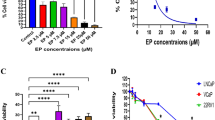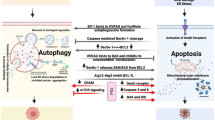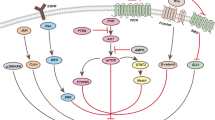Abstract
Purpose
Metformin is the most prescribed anti-diabetic medication worldwide because of its proven efficacy and limited side effects. In this study, the significant anticancer effect of metformin was investigated in both endometrial carcinoma and progesterone-resistant endometrial carcinoma cells.
Methods
We tested the growth inhibition assay using MTT cell proliferation, cell cycle assay, apoptosis assessment with flow cytometry using propidium iodide and Annexin V, and autophagy protein expression with western blot analysis.
Results
Metformin inhibited the growth of cancer cells with different concentrations in a dose- and time-dependent manner. Moreover, the inhibition properties observed as a function of increased concentrations of metformin were markedly augmented when the medication was administered in the progesterone-resistant Ishikawa cells, even with a dose as low as 10 mM. The early and late phases of apoptosis were enhanced in the metformin-treated tumour cells that were analyzed. For the Ishikawa cells, the expression of p-AMPK, LC-3, and beclin1 was upregulated after treatment, whereas the AMPK levels were not modulated. Furthermore, for the Ishikawa-PR cells, the protein levels were similarly upregulated. Finally, we observed that the three proteins showed much more variability in Ishikawa-PR cells than in Ishikawa cells.
Conclusion
The application of metformin to target autophagy in endometrial cancer cells provides a new potential treatment for progesterone-resistant endometrial carcinoma.



Similar content being viewed by others
References
Amant F, Moerman P, Neven P, Timmerman D, Van Limbergen E, Vergote I (2005) Endometrial cancer. Lancet 366(9484):491–505
Yang S, Thiel KW, Leslie KK (2011) Progesterone: the ultimate endometrial tumor suppressor. Trends Endocrinol Metab 22(4):145–152
Horn LC, Meinel A, Handzel R, Einenkel J (2007) Histopathology of endometrial hyperplasia and endometrial carcinoma: an update. Ann Diagn Pathol 11(4):297–311
Prat J, Gallardo A, Cuatrecasas M, Catasus L (2007) Endometrial carcinoma: pathology and genetics. Pathology 39:72–87
Kim JJ, Kurita T, Bulun SE (2013) Progesterone action in endometrial cancer, endometriosis, uterine fibroids, and breast cancer. Endocr Rev 34(1):130–162
Ushijima K, Yahata H, Yoshikawa H, Konishi I, Yasugi T, Saito T, Nakanishi T, Sasaki H, Saji F, Iwasaka T et al (2007) Multicenter phase II study of fertility-sparing treatment with medroxyprogesterone acetate for endometrial carcinoma and atypical hyperplasia in young women. J Clin Oncol: Off J Am Soc Clin Oncol 25(19):2798–2803
Ramirez PT, Frumovitz M, Bodurka DC, Sun CC, Levenback C (2004) Hormonal therapy for the management of grade 1 endometrial adenocarcinoma: a literature review. Gynecol Oncol 95:133–138
Kim JJ, Chapman-Davis E (2010) Role of progesterone in endometrial cancer. Semin Reprod Med 28:81–90
Yamazawa K, Hirai M, Fujito A et al (2007) Fertility-preserving treatment with progestin, and pathological criteria to predict responses, in young women with endometrial cancer. Hum Reprod 22:1953–1958
Schulte JM, Rothaus CS, Adler JN (2014) Clinical decisions. Management of type 2 diabetes—polling results. N Engl J Med 370:e2
Arunachalam G, Samuel SM, Marei I, Ding H, Triggle CR (2014) Metformin modulates hyperglycaemia-induced endothelial senescence and apoptosis through SIRT1. Br J Pharmacol 171:523–535
Wright JL, Stanford JL (2009) Metformin use and prostate cancer in Caucasian men: results from a population-based case-control study. Cancer Causes Control 20:1617–1622
Li D, Yeung SC, Hassan MM, Konopleva M, Abbruzzese JL (2009) Antidiabetic therapies affect risk of pancreatic cancer. Gastroenterology 137:482–488
Bodmer M, Meier C, Krahenbuhl S, Jick SS, Meier CR (2010) Long-term metformin use is associated with decreased risk of breast cancer. Diabetes Care 33:1304–1308
Feng Y, Ke C, Tang Q, Dong H, Zheng X, Lin W, Ke J, Huang J, Yeung S-CJ, Zhang H (2014) Metformin promotes autophagy and apoptosis in esophageal squamous cell carcinoma by down regulating Stat3 signaling. Cell Death Dis 5:e1088
Jiang Y, Huang W, Wang J, Xu Z, He J, Lin X, Zhou Z, Zhang J (2014) Metformin plays a dual role in MIN6 pancreatic β cell function through AMPK-dependent autophagy. Int J Biol Sci 10(3):268–277
Zakikhani M, Dowling RJ, Sonenberg N, Pollak MN (2008) The effects of adiponectin and metformin on prostate and colon neoplasia involve activation of AMP-activated protein kinase. Cancer Prev Res (Phila Pa) 1:369–375
Dowling RJ, Zakikhani M, Fantus IG, Pollak M, Sonenberg N (2007) Metformin inhibits mammalian target of rapamycin-dependent translation initiation in breast cancer cells. Cancer Res 67:10804–10812
Currie CJ, Poole CD, Gale EA (2009) The influence of glucose-lowering therapies on cancer risk in type 2 diabetes. Diabetologia 52:1766–1777
Li Xin, Guo Yan-Rong, Lin Jin-Fang, Feng Yi, Billig Håkan, Shao Ruijin (2014) Combination of Diane-35 and metformin to treat early endometrial carcinoma in PCOS women with insulin resistance. J Cancer 5(3):173–181
He XX, Tu SM, Lee MH, Yeung SC (2011) Thiazolidinediones and metformin associated with improved survival of diabetic prostate cancer patients. Ann Oncol 22:2640–2645
Ben Sahra I, Le Marchand-Brustel Y, Tanti JF, Bost F (2010) Metformin in cancer therapy: a new perspective for an old antidiabetic drug? Mol Cancer Ther 9(5):1092–1099
Cantrell LA, Zhou C, Mendivil A, Malloy KM, Gehrig PA, Bae-Jump VL (2010) Metformin is a potent inhibitor of endometrial cancer cell proliferation—implications for a novel treatment strategy. Gynecol Oncol 116(1):92–98
Takahashi Akimasa, Kimura Fuminori, Yamanaka Akiyoshi, Takebayashi Akie, Kita Nobuyuki, Murakami Kentaro Takahashiand Takashi (2014) Metformin impairs growth of endometrial cancer cells via cell cycle arrest and concomitant autophagy and apoptosis. Cancer Cell Int 14:53–64
Kimmelman AC (2011) The dynamic nature of autophagy in cancer. Genes Dev 25:1999–2010
Ibeanu OA (2011) Molecular pathogenesis of cervical cancer. Cancer Biol Ther 11:295–306
Sivridis E, Giatromanolaki A, Liberis V et al (2011) Autophagy in endometrial carcinomas and prognostic relevance of ‘stone-like’ structures (SLS): what is destined for the atypical endometrial hyperplasia? Autophagy 7:74–82
Park SM, Kim K, Lee EJ et al (2009) Reduced expression of DRAM2/TMEM77 in tumor cells interferes with cell death. Biochem Biophys Res Commun 390:1340–1344
Hanna RK, Zhou C, Malloy KM, Sun L, Zhong Y, Gehrig PA, Bae-Jump VL (2012) Metformin potentiates the effects of paclitaxel in endometrial cancer cells through inhibition of cell proliferation and modulation of the mTOR pathway. Gynecol Oncol 125(2):458–469
Shao R (2013) Progesterone receptor isoforms A and B: new insights into the mechanism of progesterone resistance for the treatment of endometrial carcinoma. Ecancer 7:381–388
Vazquez-Martin A, Oliveras-Ferraros C, Lopez-Bonet E, Menendez JA (2009) AMPK: evidence for an energy-sensing cytokinetic tumor suppressor. Cell Cycle 8:3679–3683
Author information
Authors and Affiliations
Corresponding author
Ethics declarations
Ethical approval
This article does not contain any studies with human participants performed by any of the authors.
Funding
This study was funded by Ningbo natural foundation (Grant Numbers: 2014A610234; 2015A610226).
Conflict of interest
The authors declare that they have no conflict of interest.
Rights and permissions
About this article
Cite this article
Zhuo, Z., Wang, A. & Yu, H. Metformin targeting autophagy overcomes progesterone resistance in endometrial carcinoma. Arch Gynecol Obstet 294, 1055–1061 (2016). https://doi.org/10.1007/s00404-016-4148-0
Received:
Accepted:
Published:
Issue Date:
DOI: https://doi.org/10.1007/s00404-016-4148-0




